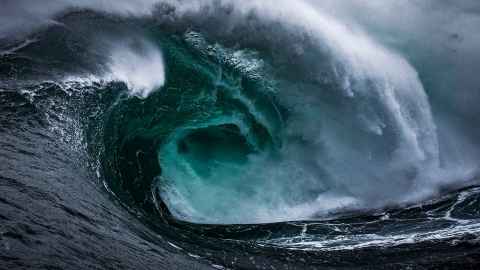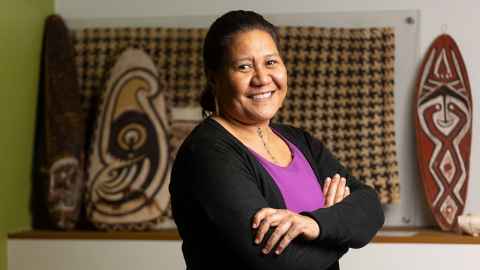Jemaima Tiatia-Siau: 'We're all in this ocean together'
23 May 2023
Opinion: Pro Vice-Chancellor Pacific, Jemaima Tiatia-Siau, explores the concept of the Pacific Ocean as a living entity.

Oceania is vast, Oceania is expanding, Oceania is hospitable and generous,
Oceania is humanity rising from the depths of brine and regions of fire deeper still, Oceania is us. We are the sea, we are the ocean.
– Professor Epeli Hau’ofa (1939-2009)
There is a deep and inseparable connection to the environment and the cosmos for Pacific peoples beyond that of simply belonging. Our natural surroundings are embedded in the Pacific psyche and ways of knowing, doing and being.
The Pacific Ocean, a living entity, has been an integral part of the beliefs and cultures of Pacific peoples for eons. It is often seen as having its own spirit and consciousness: a life source deemed a powerful deity or divine force.
Many Pacific creation stories tell how the ocean was formed and how it shapes the world around us. This connection has led to a strong ethic among many, who view the ocean as a ‘measina’, a taonga, a treasure to be protected and preserved. Our environment was never meant to be feared, but respected and embraced.
We have scientific knowledge to work towards protecing our oceans, but wider thinking is also required.
A recent Health Research Council study I led examined the nexus between climate change, mental health and well-being and its impact on Pacific peoples, specifically garnering the world views of those living in the Cook Islands, Niue and Christchurch.
The results underscore the relevance of climate change for Auckland, particularly in light of recent climatic events that had a significant and ongoing impact.
It is essential to consider and address intangible effects, such as the impact on mental health and well-being, and the repercussions of death, displacement and decimation of marae, for example.

Dealing with climate change requires more than simply reducing carbon emissions. It involves advocating for climate equity and justice.
Impacts, both tangible and intangible, do not discriminate and all require our comprehensive attention and action.
It would be difficult to deny that the Auckland floods and Cyclone Gabrielle were climate-change related. But dealing with climate change requires more than simply reducing carbon emissions. It involves advocating for climate equity and justice, as exemplified by climate-change warriors across the Pacific where, despite contributing less than 0.03 percent of the globe’s overall greenhouse gas emissions, the region is highly susceptible to its detrimental effects.
Nevertheless, the Pacific region is dedicated to transitioning towards a low-carbon economy. And this includes Waipapa Taumata Rau. One of our goals is to move towards being a sustainable university by 2030.
We have responsibilities and ties to neighbouring Pacific countries and it is our duty to maintain these alliances, but political commitment is critical. We need a government that recognises the value of preserving Aotearoa, our cities, our universities and our ocean. We must evolve beyond our conventions and comfort zones. Having a one-dimensional perspective is not beneficial; being open to a multiplicity of world views will enhance our understanding of the environment.
How frequently have our Pacific neighbours experienced environmental calamities? Being prepared and resilient in the face of disasters is almost part of their DNA.
Indigenous knowledge systems of innovation, adaptation, mitigation and preparedness all exist from which we could learn.
Because ultimately, as I-Kiribati African American poet and scholar Teresia Teaiwa wrote, “We sweat and cry salt water, so we know that the ocean is really in our blood.”
This article ran as the editorial in the Autumn 2023 edition of Ingenio magazine.